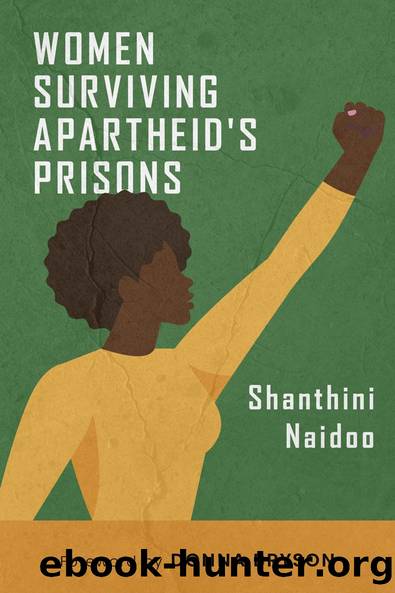Women Surviving Apartheid's Prisons by Shanthini Naidoo Donna Bryson

Author:Shanthini Naidoo, Donna Bryson [Shanthini Naidoo, Donna Bryson]
Language: eng
Format: epub
ISBN: 9781682570982
Barnesnoble:
Publisher: Just World Books
Published: 2021-01-01T00:00:00+00:00
The cells were grey cement floor, and not much else. The draft that came in under the door brought the cold. There was mesh over a single small window, and a naked light bulb, very brightâfor others, no light. Hours became days, became weeks and months with little changing for Nondwe apart from her mind running riot.
âWhat did I do for a year? Sjoe. In the morning, I would do my exercises and my loo, then after wash myself in the bucket. I had to get soap, when I could. I had a toothbrush and toothpaste sometimes, but that would get finished and you donât know when you would get it again. Then, I would wash my clothes and fold them neatly. If you put the clothes under the blanket and sit on it, it would take out some of the wrinkles. Before the loo bucket comes out, the breakfast has already been there waiting.â
Nondwe has a forthright way of storytelling. âSome days, they take away the bucket early, other days it is with you when you eat. You donât see anything or anyone. I donât even know who took the bucket. The room was so small. We were supposed to have time to exercise but we didnât get that. Not a single day did I see anyone else. Their plan is that nobody must know who you are. Whenever a door is open you must stand up to attention as a prisoner. Even if you donât see anyone, you have to do it,â she says.
She believes that lying on the cold floor made her feel ill for most of the day. âIf you were a favourite you got an extra mat. Otherwise, we had three thin blankets.â
She, too, feared anything that was given to them. âIf they gave you medication, you didnât take it. We didnât trust them. Something in the food was not right. Maybe it was the cold, maybe the food, but I know for a whole year, my menstruation stopped.â
The international community frowned on South Africaâs detention and treatment of political prisoners, and expected them to be treated well if they were detained.
âEvery second week a magistrate would come around to the cells and ask, âWhat is your complaint?â He would try to speak English, isiXhosa and isiZulu. After four times of telling him my complaints with no results, I said, âIâm not answering anythingâ and I just looked at him. Eventually I said, âIâve been telling you, I donât get exercise, I donât get anything from my people, no visits. My people are far away, not even a letter arrives. Why must I say Iâm all right?ââ
That resistance was futile, Nondwe would learn.
âDuring the day I walked, up and down the cell. Itâs small (1.5 by 4 meter). One time I found two pins. I took a piece of thread and tried to crochet. Then, I would undo it, and do it again. We had more than a year of this, only interrogation in between and once or twice to the Synagogue for the trial.
Download
This site does not store any files on its server. We only index and link to content provided by other sites. Please contact the content providers to delete copyright contents if any and email us, we'll remove relevant links or contents immediately.
Anka's Secret: An epic, heartbreaking, and powerful World War 2 novel based on true events by Tamar Ohrenstein(326)
American Seoul by Rho Helena(226)
Vice President Kamala Harris by Malaika Adero(215)
Owner of a Lonely Heart by Beth Nguyen(189)
Persephone's Children by Rowan McCandless(169)
The Life of Madie Hall Xuma by Wanda A. Hendricks(159)
The Little Girl Who Could Not Cry by Lidia Maksymowicz(157)
Girl Uprooted: A Memoir by Lena Lee(156)
From Liberty To Magnolia by Janice Ellis(151)
The Survivor From Block 19 by Arie Blumenfeld(151)
Mi historia by Rosa Parks & Jim Haskins(151)
634 Ways to Kill Fidel by Fabian Escalante(145)
A Hole In the Clouds by Maryles Casto(141)
Women Surviving Apartheid's Prisons by Shanthini Naidoo Donna Bryson(141)
Growing Out by Barbara Blake Hannah(138)
Black Founder by Stacy Spikes(130)
Remembering the Power of Words by Unknown(128)
My Childhood's Days in Slavery by Annie L. Burton(128)
Truths and Lies in the Middle East by Eric Rouleau Martin Makinson(124)
